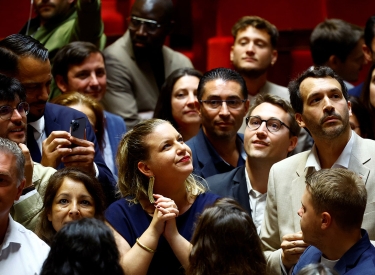The Anti-Democratic Revolt
In Britain, populist politics has flooded from the extremist periphery into the very centre of public life. Jeremy Corbyn, who worked for the Iranian propaganda machine Press TV, who made warm speeches on anniversaries of the Iranian revolution, who consistently sides with antisemites against Jews, who has for a whole career thrilled in solidarity with terrorist movements, who prioritises “peace” over freedom, who blames the democratic states for all of the problems of authoritarian rule, has a clear chance to win a general election and to walk into 10 Downing Street. And a nationalist Conservatism has come into the British mainstream, elbowing a liberal and internationalist market conservatism out of its way; it is nostalgic for a Britain in which every white man could, through the dignity of manual labour, nurture his wife and children; it is nostalgic also for a Britain economically connected to its global empire rather than its European neighbours.
And populism is not only a British phenomenon. The rise of the Trump movement, even on the morning after the Brexit referendum only five months before its victory, seemed absurd and impossible. The populists are on the rise across Europe, in France, in Germany, in Austria, in Poland, in Hungary, in the Netherlands, in Belgium and in Italy; and notably in Brazil and in Turkey and in Russia too.
Left and right populism have more in common than their supporters would like to admit. They share a fear of (neo)liberalism, which is the name they give to the democratic system they seek to tear down and replace; they prefer a warm notion of national community to international trade, international institutions and agreements, to global human rights and law, and to humanitarian intervention. They blame their own country’s “elites” for selling their people to the dark global forces behind international finance capital, which is to them much more frightening than decent, muscular, open “productive” capital.
Adolf Hitler demonized the “people who are at home both nowhere and everywhere, who do not have anywhere a soil on which they have grown up, but who live in Berlin today, in Brussels tomorrow, Paris the day after that, and then again in Prague or Vienna or London, and who feel at home everywhere”
Theresa May, certainly no Hitler herself, mirrored this rhetoric: “But today, too many people in positions of power behave as though they have more in common with international elites than with the people down the road, the people they employ, the people they pass in the street. But if you believe you’re a citizen of the world, you’re a citizen of nowhere. You don’t understand what the very word ‘citizenship’ means.”
I remember thrilling to the old slogan “socialism or barbarism”. But within that slogan there was far too much agreement from the left with the fascist idea that existing democracy was fatally flawed and that the task now was to smash it and to begin again from year zero. We need to defend democratic states, democratic cultures, the rule of law, freedom of speech and association and the principle that all human beings are profoundly of equal value. This is not the moment to join with the fascists in demonizing the Clintons and the Blairs, the Merkels and the Macrons; this is the moment to side with the democratic state against the populist threat to it.
In Britain there are currently two sets of cadres building themselves into potentially formidable movements. On the populist left, there are people educating themselves that between “us” and “socialism” lies the Zionists and their Jewish supporters; on the populist right, there are people educating themselves that between “us” and the Brexit good life are those who will betray the will of the people: the people in the cities; the educated; the “elite” and the “political class” and the unseen powers behind them.
We don’t know what will happen in two months, let alone the next few years. But the mainstreaming of these views of the world, each so closely mirroring familiar antisemitic narrative, is a threat not only to Jews but to democratic politics and to democratic practical and scholarly thinking.


 Wenn der Teufel Kreide frisst
Wenn der Teufel Kreide frisst

